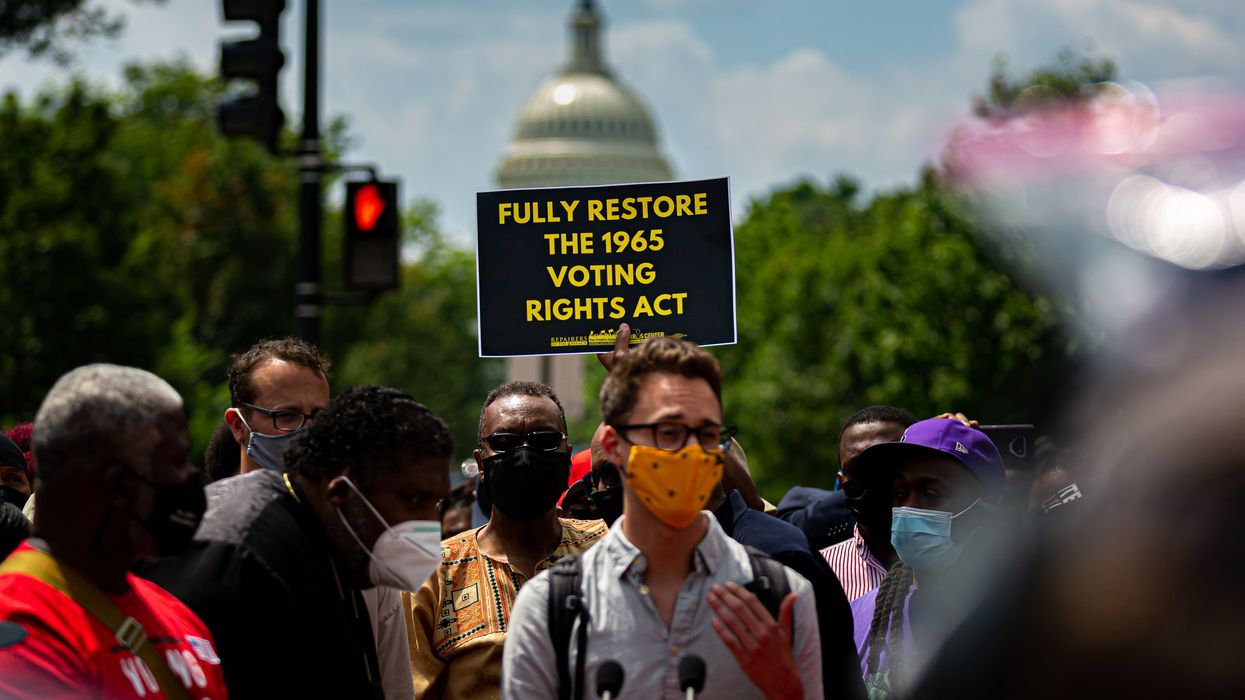Adair is communications and operations manager for Stand Up America.
This is part of a series offering a nonpartisan counter to Project 2025, a conservative guideline to reforming government and policymaking during the first 180 days of a second Trump administration. The Fulcrum's cross partisan analysis of Project 2025 relies on unbiased critical thinking, reexamines outdated assumptions, and uses reason, scientific evidence, and data in analyzing and critiquing Project 2025.
As we mark the 59th anniversary of the Voting Rights Act this week, Black voters and other voters of color face a renewed effort to erode critical civil rights protections and to increase barriers at the ballot box.
The Voting Rights Act was designed to safeguard voters of color from discriminatory practices that diminish their voting power. In recent years, the Supreme Court has chipped away at the VRA’s protections, undermining the power of voters of color. However, some on the right would like to go even further. Project 2025, the Heritage Foundation’s extreme agenda for a second Trump administration, could take America back to the Jim Crow era.
Project 2025 stands as the antithesis to the spirit of the Voting Rights Act. It seeks to fundamentally alter the federal government and reshape every aspect of Americans’ lives by implementing an anti-democratic, far-right agenda aimed at taking away our fundamental rights and freedoms.
Project 2025 proposes stripping the Department of Justice’s integral Civil Rights Division, which defends Americans of color in civil rights cases. This would open the floodgates for bad actors to discriminate against Americans of color in every aspect of their lives, from voting rights to housing to employment to education. This election year alone, the DOJ has already stood on the side of voters in New Hampshire who received intimidating calls as part of a robocall scheme during their presidential primary — calls that were a direct violation of the Voting Rights Act.
The proposal would also raise campaign contribution limits, giving the rich and powerful an even louder voice in our elections and drowning out the voices of ordinary citizens. It would be remiss to ignore that white Americans make up the majority of this affluent group.
Project 2025 would force the DOJ’s Criminal Division to investigate “voter registration fraud and unlawful ballot correction” — currently a responsibility of the Civil Rights Division. The myth of widespread voter fraud has continually been disproven, and this change only seeks to intimidate Black voters suffering disproportionately from these falsehoods.
It’s no surprise that Project 2025 targets the civil rights and political power of Americans of color. At least five of the authors of the agenda, like writer Richard Hanania and retired politician Corey Stewart, have a history of writing essays for white supremacist publications or praising white nationalists. Project 2025 clearly promotes hate and division, evidenced by the fact that seven of the organizations sitting on the advisory board are designated as extremist or hate groups.
However, there’s still time to inform voters — particularly voters of color — of who’s behind Project 2025 and the extreme policies they are pushing. Some political leaders, including members of the Congressional Black Caucus, are already highlighting the harm many policies would unleash on Black and Brown communities. Black leaders in the pro-democracy space launched Project FREEDOM to help educate and mobilize voters of color ahead of November.
Former President Donald Trump wants to feign ignorance and distance himself from Project 2025, acting as if it has nothing to do with his campaign. Americans shouldn’t be fooled when our rights and fundamental freedoms are on the line. At least 140 people who helped craft Project 2025 worked in the Trump administration as key advisors or former staff.
The 59th anniversary of the Voting Rights Act reminds us of the sacrifice and resistance of Black leaders in the civil rights movement and the ongoing struggle to cultivate a truly representative democracy. There’s a lot at stake this November and Project 2025 presents a unique threat to our democracy. Let’s honor the work of those who came before us by making our voices heard this November. By defeating Project 2025 we will protect our fundamental freedoms.
More articles about Project 2025
- A cross-partisan approach
- An Introduction
- Rumors of Project 2025’s Demise are Greatly Exaggerated
- Department of Education
- Managing the bureaucracy
- Department of Defense
- Department of Energy
- The Environmental Protection Agency
- Education Savings Accounts
- Department of Veterans Affairs
- The Department of Homeland Security
- U.S. Agency for International Development
- Affirmative action
- A federal Parents' Bill of Rights
- Department of Labor
- Intelligence community
- Department of State
- Department of the Interior
- Federal Communications Commission
- A perspective from Europe
- Department of Health and Human Services
- Voting Rights Act
- Another look at the Federal Communications Commission




















Trump & Hegseth gave Mark Kelly a huge 2028 gift